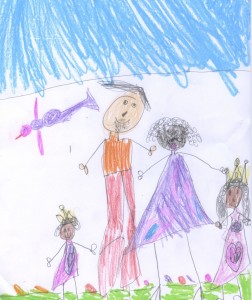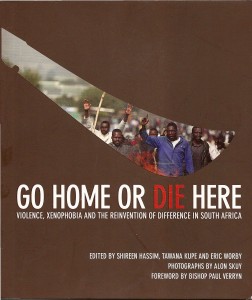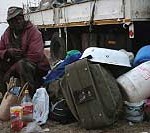Simple things sometimes seem the most difficult to accept. We protest that the hardest place to tackle gender inequity is in the privacy of the home and then we spend little or no time in our work on women’s rights, feminism and masculinities examining the area where we interact most in [...]]]>

Are we missing something in the gender debate? Credit: Zuwa Davies
Simple things sometimes seem the most difficult to accept. We protest that the hardest place to tackle gender inequity is in the privacy of the home and then we spend little or no time in our work on women’s rights, feminism and masculinities examining the area where we interact most in the home – in the raising of our children.
Perhaps I am not looking very hard but I have yet to see a sympathetic feminist analysis on motherhood and parenting. Most of the women’s movement seem to only analyse childbearing and caring from an ‘unfair burden of care’ perspective. This ignores the rich rewards many modern women feel from their roles as parents and, in some cases, makes even enlightened women feel ‘guilty’ about valuing themselves as mothers and integrating careers and family life.
I feel sometimes that my own work on fatherhood is seen as a nice touchy feely subject for me to be fascinated with – but not really mainstream from a gender transformative perspective. Many men in our movement seem caught in the ‘men as monsters / deficient men’ mode – apologising forever for our inadequacies and violence and unable to move to a more holistic view of masculinity and promoting our male caring roles rather than concentrating on only challenging our ‘dark side’.
These binaries of opposition between male and female activists don’t take us very far and offer little in the search for gender equity between the sexes beyond mudslinging at each other. In the meantime a whole new generation of children is being raised with the same old gender stereotypes and attitudes.
The best place to change their attitudes is in the home and research shows that the best time is from the earliest age possible. Yet very little support is given to parenting by the state and agencies with a real stake in gender transformative work.
In Zimbabwe the African Fathers Initiative is calling for a gender sensitive Parenting Action Plan (PAP) as an urgent priority. This plan will, amongst other things, give advice to all parents about raising children without recourse to physical punishment such as smacking and beating. It will enshrine the rights of children to emotional and financial support from both parents even when their own adult relationship is in trouble or breaks down completely. We want a parenting advice hotline and agencies and workers trained to give advice across the country.
Any society that is failing to adequately care for and raise its children, whatever its other successes, is a failing society. In addressing this failure seriously we can impart new inter-generational values to our children around care and respect for each other and minimize the restrictive gendered roles that are producing so much pain and suffering for young children who are our next generation of parents.
This is the baby elephant in the room that both men and women in the gender movement need to acknowledge and work with.
Trevor Davies is Director of the African Fathers Initiative, which seeks to promote gender equitable care in parenting and the promotion of more active and involved fatherhood as a key driver of child development.
]]>What if another wave of xenophobic violence unfurled, like the one that shook South Africa to the core a year ago? It left 50 dead and about 150,000 displaced, [...]]]>
 When friends ask me about the World Soccer Cup in South Africa in June 2010, I say there is only one if, but a big if.
When friends ask me about the World Soccer Cup in South Africa in June 2010, I say there is only one if, but a big if.
What if another wave of xenophobic violence unfurled, like the one that shook South Africa to the core a year ago? It left 50 dead and about 150,000 displaced, terrified and destitute immigrants – black, African and foreign. (Click here to see a slideshow)
The army stepped in and the violence subsided. But xenophobia still simmers. In June, IPS reported on yet more murders of Somalis in the Western Cape province. These are so common – 52 in 2008 – they don’t even make national news. Only a really gruesome murder of Somalis – a mother and her children killed and dismembered in their spaza shop last year – makes the front page. Otherwise, murdered Somalis earn only a short news item.
Zimbabweans, Congolese, Tanzanian, Ethiopians and Bangladeshis were also murdered this year – shot, burnt alive, and pushed off a sixth floor from Durban to Cape Town.
“Violence against foreigners is rapidly becoming fully integrated into the standard politics of some townships,” Loren Landau, director of the University of the Witwatersrand’s Forced Migration Studies Programme, told IPS.
A recent report by the Consortium for Refugees and Migrants in South Africa notes that there were no convictions for rape and murder committed during the 2008 attacks, sending a message of impunity.
The report “Protecting refugees, asylum seekers and immigrants in South Africa” says there is little reason to believe that attacks against “outsiders” will not happen again.
For now, the country is in honeymoon period with the new government elected in April on a platform of service delivery and job creation, topped with the success of the soccer Confederations Cup in June.
But if disappointment over unmet expectations coupled with recession sets in, frustration could turn into xenophobic violence.
Violent masculinities
Earlier this year, an insightful and distressing collection of essays, “Go Home or Die Here”, analysed the 2008 attacks.

Photo: IPS
From a gender perspective, the authors argue that “negrophobic xenophobia is couched as a battle between two sets of men. (…) the anxieties provoked by economic exclusion and social fragmentation have found expression in violent masculinities, in which weapons are an extension of maleness, and women are no more than bodies to be possessed.”
The striking photos by Alon Skuy illustrate this point. Most are men – rioters armed with sticks and machetes, rifle-toting policemen, bloodied corpses. The few women are at camps for the displaced.
The book’s graphic layout is so sleek that I found it disturbing – a coffee table book on xenophobia? It is borderline with the glamorisation of violence – the gold light bathed photos of angry young men grinning as they chase hapless foreigners.
The photos gave me the same eerie feeling I had in the cholera camps of Goma, in the aftermath of the Rwandan genocide in 1994. Talking to genocidaires, I felt in them pure hatred and a taste for violence. “The problem is that we didn’t kill all the Tutsi cockroaches,” one told me.
The Consortium report notes that “rumours of groups mobilising to finish the job started in May 2008 (…) may easily lead to further violence and displacement”.
If that happens, don’t expect many Africans to come watch soccer in South Africa in 2010.
]]>